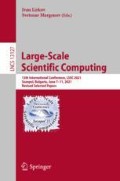Abstract
By use of Fourier time series expansions in an angular frequency variable, time-harmonic optimal control problems constrained by a linear differential equation decouples for the different frequencies. Hence, for the analysis of a solution method one can consider the frequency as a parameter. There are three variables to be determined, the state solution, the control variable, and the adjoint variable.
The first order optimality conditions lead to a three-by-three block matrix system where the adjoint optimality variable can be eliminated. For the so arising two-by-two block system, in this paper we study a factorization method involving an exact Schur complement method and illustrate the performance of an inexact version of it.
Supported by EU Horizon 2020 research and innovation programme, grant agreement number 847593; the Czech Radioactive Waste Repository Authority (SÚRAO), grant agreement number SO2020-017; VR Grant 2017-03749 Mathematics and numerics in PDE-constrained optimization problems with state and control constraints, 2018-2022.
Access this chapter
Tax calculation will be finalised at checkout
Purchases are for personal use only
References
Tröltzsch, F.: Optimal Control of Partial Differential Equations: Theory, Methods, and Applications. Graduate Studies in Mathematics, vol. 112. American Mathematical Society, Providence, RI (2010)
Axelsson, O., Neytcheva, M., Ström, A.: An efficient preconditioning method for the state box-constrained optimal control problem. J. Num. Math. 26, 185–207 (2018)
Liang, Z.-Z., Axelsson, O., Neytcheva, M.: A robust structured preconditioner for time-harmonic parabolic optimal control problems. Numer. Algorithms 79(2), 575–596 (2017). https://doi.org/10.1007/s11075-017-0451-5
Axelsson, O., Lukáš, D.: Preconditioning methods for Eddy-current optimally controlled time-harmonic electromagnetic problems. J. Numer. Math. 27, 1–21 (2019)
Axelsson, O., Neytcheva, M., Ahmad, B.: A comparison of iterative methods to solve complex valued linear algebraic systems. Numer. Algorithms 66(4), 811–841 (2013). https://doi.org/10.1007/s11075-013-9764-1
Axelsson, O., Neytcheva, M.: Preconditioners for two-by-two block matrices with square blocks, TR 2018-010. Department of Information Uppsala University Technology (2018)
Axelsson, O., Béreš, M., Blaheta, R.: Computational methods for boundary optimal control and identification problems. Math. Comput. Simul. 189, 276–290 (2021)
Saad, Y.: Iterative Methods for Sparse Linear Systems, 2nd edn. SIAM, Philadelphia (2003)
Axelsson, O.: Iterative Solution Methods. Cambridge University Press, Cambridge (1994)
Liang, Z.-Z., Axelsson, O.: Exact inverse solution techniques for a class of complex valued block two-by-two linear systems. Numer. Algor. (2021). https://link.springer.com/journal/11075/online-first?page=2
Ammari, H., Buffa, A., Nédélec, J.-C.: A justification of Eddy currents model for the Maxwell equations. SIAM J. Appl. Math. 60(5), 1805–1823 (2000)
Axelsson, O., Karatsson, J.: Superlinear convergence using block preconditioners for the real system formulation of complex Helmholtz equations. J. Comput. Appl. Math. 340, 424–431 (2018)
Axelsson, O., Lukáš, D., Neytcheva, M.: An exact and approximate Schur complement method for time-harmonic optimal control problems (2021)
Notay, Y.: An aggregation-based algebraic multigrid method. Electron. Trans. Numer. Anal. 37, 123–146 (2010)
Author information
Authors and Affiliations
Corresponding author
Editor information
Editors and Affiliations
Rights and permissions
Copyright information
© 2022 Springer Nature Switzerland AG
About this paper
Cite this paper
Axelsson, O., Lukáš, D., Neytcheva, M. (2022). An Exact Schur Complement Method for Time-Harmonic Optimal Control Problems. In: Lirkov, I., Margenov, S. (eds) Large-Scale Scientific Computing. LSSC 2021. Lecture Notes in Computer Science, vol 13127. Springer, Cham. https://doi.org/10.1007/978-3-030-97549-4_10
Download citation
DOI: https://doi.org/10.1007/978-3-030-97549-4_10
Published:
Publisher Name: Springer, Cham
Print ISBN: 978-3-030-97548-7
Online ISBN: 978-3-030-97549-4
eBook Packages: Computer ScienceComputer Science (R0)

